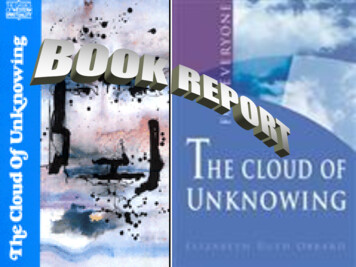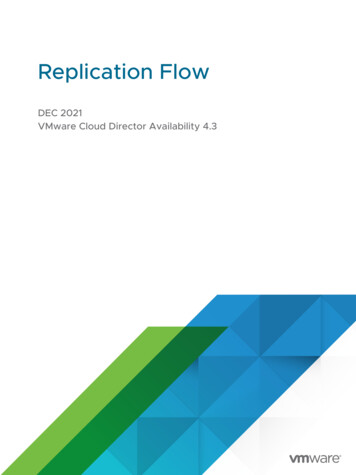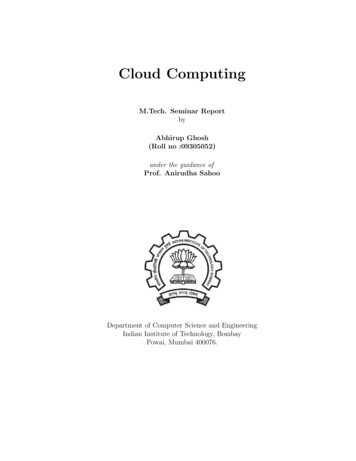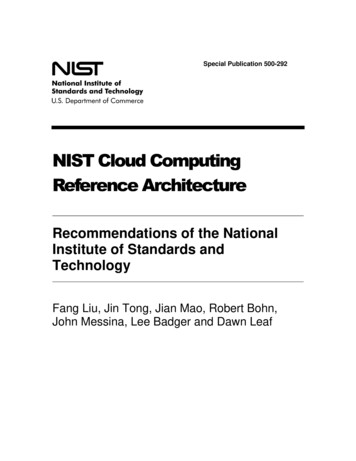
Transcription
3/4/2016The Cloud of Unknowing1
PRAYER TO THE HOLY SPIRIT (All)I. HISTORICAL CONTEXT (Paul Pham)a. THE AUTHOR OF THE CLOUD OF UNKNOWING?b. WHEN DID THE AUTHOR WRITE THE CLOUD OFUNKNOWING?c. WHAT WAS HAPPENING THEN?d. WHERE DID HE WRITE?e. WHO ARE THE AUDIENCES?II. BRIEF INTRODUCTION (Paul Pham)III. Marie will do part II of the bookreport (Maria Mendez-Nunez)
Come Holy Spirit, fill thehearts of your faithful andkindle in them the fire of yourlove.Send forth your Spirit and theyshall be created. And You shallrenew the face of the earth.O, God, who by the light of theHoly Spirit, did instruct thehearts of the faithful, grantthat by the same Holy Spiritwe may be truly wise and everenjoy His consolations,Through Christ Our Lord,Amen.
The author remain anonymous A reflection of his humility To search the content, sources and authorship of theCloud of Unknowing might seem a futile exercise. Scholars have been able to figure out a great deal aboutthe author’s historical context, his sources and his spiritualheritage. Several scholars point to his being a priest and acontemplative monk, likely a Carthusian.
The Carthusian Order, Also called the Order of St. Bruno, A Roman Catholic religious order of enclosedmonastics. Founded by Saint Bruno of Cologne in 1084 Includes both monks and nuns. Has its own Rule, called the Statutes.3/4/2016The Cloud of Unknowing7
Carthusian is derivedfrom the ChartreuseMountains; Saint Bruno built his firsthermitage in the valley ofthese mountains in theFrench Alps The motto "The Cross issteady while the world isturning.“3/4/2016The Cloud of Unknowing9
This is the picture of St. Bruno at Prayer
The Carthusian monastery is acommunity. They pass the greater part of their lifein their cell where they pray, and work.
Drew from several rich currents of theCatholic contemplative heritage,principally from Scripture. Almost a hundred citations toScripture Including Psalms Also a significant number from theCanticle of Canticles, Also understandable given themonastic predilection for acontemplative and mystical reading.
New Testament: Sixty-five referencesto the Gospels Twenty-threereferences to thePauline Epistles.
Liturgical references to the DivineOffice, References to Patristic and Medievalcontemplative authors, such as Bernardand Richard of Saint Victor. References to Augustine and Gregorythe Great; Utilization of the contemplativetheology of Thomas of Aquinas.
3/4/2016The Cloud of Unknowing15
Fourteenth-century3/4/2016The Cloud of Unknowing16
A troubled and dark time. The Papacy in the period of the "Babylonian Captivity" inAvignon, France Cause of scandal for English Catholics. The Avignon Papacy lasted with seven popes resided inAvignon, France:1. Pope Clement V: 1305–13142. Pope John XXII: 1316–13343. Pope Benedict XII: 1334–13424. Pope Clement VI: 1342–13525. Pope Innocent VI: 1352–13626. Pope Urban V: 1362–13707. Pope Gregory XI: 1370–13783/4/2016The Cloudof Unknowing In1376, Gregory XI backto Romeand died there in 1378.17
The Great Schism of Western Christianity was a splitwithin the Roman Catholic Church from 1378 to 1417. Three men simultaneously claimed to be the truepope. The schism was ended by the Council of Constance(1414–1418).3/4/2016The Cloud of Unknowing18
3/4/2016The Cloud of Unknowing19
The prologue points that the author simplyaddressing, to an individual whom he knew and wishedto help, An essay previously written for beginners in theDionysian contemplative method of prayer, Offering specific advice as to whether the novice wasbeing called to this form of contemplation and the ruleof life demanded for its practice. According to Dr. Hodgson, the audience was not ascholar which introduces in five chapters (35-39): “. . .there are certain preparatory exercises which shouldoccupy the attention of the contemplative learner: thelesson,thepetition.”3/4/2016 the meditationTheandCloud ofUnknowing20
There are no scriptural citations in Latin: a fact that mayindicate a lack of theological proficiency on the novice addressee. A young man, only twenty-four when he began to read the Cloudof Unknowing; His learning may equally be that of a beginner According to Richard Methley, the individual audience wasalready a Carthusian when he received his personal copy of theCloud of Unknowing, At least have finished his novitiate since the author insists onbeing his personal director: "I make no secret, as you see, of thefact that I want to be your spiritual father; indeed I do, and intendto be so."3/4/2016The Cloud of Unknowing21
The author has adapted a copy ofhis highly individual introduction toand commentary on the MysticalTheology for a particular audience: One just undertaken the life of asolitary, Or who has entered the CarthusianOrder after spending some years asa Benedictine or a Cistercian3/4/2016The Cloud of Unknowing22
Widely recognized as a classic ofMedieval Catholic spirituality. Clifton Wolters has written: "Thisbook is one of the devotional classicsof the English Church, and perhapsthe greatest of them all. No one whoreads it can fail to catch somethingof its splendor and charm."3/4/2016The Cloud of Unknowing23
Dom David Knowles writes of theauthor that he is “perhaps the mostsubtle and incisive, as well as the mostoriginal spiritual writer in the Englishlanguage." Evelyn Underhill writes of the work: "Itsprings from an age when Englishmysticism was in full flower. This is thepure doctrine of mysticism."3/4/2016The Cloud of Unknowing24
Thomas Merton highly praised thewriter. Johnston writes that an early-ontranslation into Latin of the Cloud,might well have influenced a rangeof continental contemplatives andmystics, including John of the Cross.3/4/2016The Cloud of Unknowing25
The contemporary "centering prayer"movement, has been significantlyinfluenced by the Cloud; Basil Pennington affirmed thatcentering prayer is simply a repackagingof the Cloud.3/4/2016The Cloud of Unknowing26
The Cloud in key texts of theJewish scriptures revealing theDivine Presence (see for instanceExodus 13:21ff.; 14:19f ; Psalms18:10, 104:3; Judges 5:4; Ezekiel1:4, etc.).3/4/2016The Cloud of Unknowing27
In the New Testament: From the cloud that the Father speaksat Christ's transfiguration (Matthew 17:5;Mark 9:9; Luke 9:34), Jesus ascends into a cloud at the end ofhis earthly ministry (Acts 1:9). Jesus will return in the clouds ofheaven (Matthew 26:64; Mark 14:62).3/4/2016The Cloud of Unknowing28
Such images are mere metaphors, intended topoint to the ineffable Mystery. Thus he writes:Do not think that because I call it a "darkness"or a "cloud" that it is the sort of cloud you seein the sky, or the kind of darkness you knowwhen the light is out. I do not mean that at all.By "darkness" I mean a lack of knowing for youcannot see it with your inward eye. For thisreason it is called a cloud, not of the sky, ofcourse,but of unknowing.3/4/2016The Cloud of Unknowing29
TheCloud describes his monologistic prayer: Think nounknowing.thought about God. A naked intention directed to Godalone is wholly sufficient. If you want this intentionsummed up in a word, to retain it more easily, take ashort word, preferably of one syllable, to do so. Theshorter the better, more in accord with the Spirit. A wordlike God or Love. Choose which you like, or perhaps someother, just so it is short, and fix this word to your heart sothat whatever happens it will not go away. With this wordyou are to press down all thoughts under the cloud offorgetting so that if any thought press upon you and askwhat you would have, you respond with nothing else thanthis. And if you would go on to analyze learnedly theword,tell yourself ratherthatyou will stick with the word3/4/2016The Cloudof Unknowing30as is, and not taken apart in pieces.
Offers a caveat, evidence of his great humility He hesitates to give specific recommendations to his disciple,and for two reasons: The first is this: I dare not rely on my own view and assertthat it is absolutely true; the other is that your inner make-up and your capacity for allthe things your letter speaks of are not as well known to me asthey ought to be if I am to give you adequate advice. Spiritual directors in all traditions might be so aware of theirlimits! General approach to ascetic practices. He says to line them up onthe one side, put their opposite on the other, and choosesomething in the middle, between fasting and eating, silence and3/4/2016The Cloud of Unknowing31speaking,solitude and community,etc.
But of course you will ask me what that"something” is. It is God, for whose sake youare quiet if you should be quiet, for whose sakeyou speak if you have to speak, for whose sakeyou fast if you ought to fast, and so on. Thenchoose God, and you will speak by your silence,and there will be a silence in your speech, youwill be fasting while you eat, and eating whenyou fast, and all the rest.This middle way, is the author's way "to beOned with God," the God who is known andloved by unknowing. AMEN.
The Life Styles Active1)To perform good and honest bodilyworks of mercy and of charity. Ex: Martha2) Meditate on a man’s wretchedness,the Passion of Christ, and the joys ofHeaven Contemplative3) the dark cloud of unknowing Ex. MaryMary disconsolately cried after Jesus’ death, despite theministering of angels, because “[h]er thought was that whoevertruly seeks the King of Angels will not be content to settle forangels” (XXII:1)
Who is called? All who have forsaken the world andgive themselves to contemplation. The preferable path is that of thecontemplative.“For the sign of a perfect lover is not onlythat he loves the thing he loves more thanhe loves himself, but also, in a sense, thathe hates himself on behalf of the things heloves.” (XLIII:1)
“For, when you begin it [thispath of contemplation] youwill find that there is at thestart but a darkness; there is,as it were, a cloud ofunknowing. You know notwhat it is except that you feelin your soul a naked intenttoward God.” (V:4)
God is “incomprehensible” with the power of knowledgeprovided man, but He “may be comprehended fully, but byeach in a different way” through the power of love.(IV:6)You are not to use your mind or imagination.The darkness “is a lack of knowing that includes everythingyou do not know or else that you have forgotten, whatever isaltogether dark for you because you do not see it with yourspiritual eye.” “[F]or this reason it is not called a cloud ofthe ari, but rather a cloud of unknowing that is between youand your God.” (IV:18)
Aren’t you farther from God with a cloud ofunknowing?No! “[T]o the extent that anything is in your mindother than God, you are that much further fromGod” (V:2)
“Memory of thought concerning any creature thatGod has made, or of any of their deeds, is a kind ofspiritual light; for the eye of your soul opens uponit and becomes fixed upon it, as the eye of thearcher is fixed on the spot at which he aims. And tothe extent that anything is in your other than God,you are that much further from God.” (V:2)
VIRTUE IS A DESIRE FOR GOD HIMSELF. Meekness consists in knowing yourself and being filledwith a superabundant love for God. The former isimperfect meekness, and enables the later to follow. Charity is “love of God for Himself above all creatures”(XXIV:2). One with pure charity “believes that all thosewho bring him pain and do him harm in this life are hisfull and special friends” (4).
Reading, Thinking, Prayer Reading and listening provides the framework for the latertwo. For those laboring in this path, meditations and prayerscome spontaneously.
“Itis necessary only that you meditate on theword SIN or on the word GOD, or on anycomparable word that you may prefer, notanalyzing or interpreting them with refinementsof learning, but simply considering thequalities of the words with the earnest intentionof increasing your devotion.” (XXXVI:2) Do not consider the word intellectually, butrather, as a whole “lump” (XXXVI:3).
“When these prayers are in words, as they veryseldom are, they are only in very few words”(XXXVII:2). “short prayer pierces heaven” (4) Cry out “Sin, sin, sin! Out, out, out!” (XL:2) Thiswill pierce the intruding thoughts and aid one instomping them down into the cloud of Forgetting.
“nowhere physically is everywhere spiritually”Then, “no matter where the thing on whichyou are consciously working may be, you willsurely be there in spirit” (LXVIII:2).
The division that is in a man’s nose physicallyseparating one nostril from the other is a token ofthe fact that man is to have spiritual judgment andis to distinguish the good from the evil, the evilfrom the worse, and the good from the betterbefore he gives any full judgment of anything thathe has heard or seen done or spoken about him.
3/4/2016 The Cloud of Unknowing 17 A troubled and dark time. The Papacy in the period of the "Babylonian Captivity" in Avignon, France Cause of scandal for English Catholics. The Avignon Papacy lasted with seven popes resided in Avignon, France: 1. Pope Clement V: 1305-1314 2. Pope John XXII: 1316-1334 3. Pope Benedict XII: 1334-1342 4.











